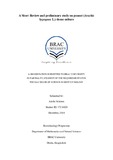A Short Review and preliminary study on peanut (Arachis hypogaea L.) tissue culture

View/
Date
2018-12Publisher
Brac UniversityAuthor
Nahreen, AshfiaMetadata
Show full item recordAbstract
Peanut (Arachis hypogaea L.) belongs to the family leguminosae and is one of the most important oil seed crops in the world. Peanut seeds contain high seed oil, proteins, amino acids and vitamin E. However, this crop faces several yield constraints like biotic and abiotic stresses. With the climate change, salt water intrusion to inland soil and loss of cultivable land makes it critical to develop a high yielding variety of peanut with salt tolerance. This can be achieved by utilizing biotechnology processes. A prerequisite for the establishment of a genetic transformation protocol is an efficient and reproducible protocol for the in vitro regeneration of peanut. For this, an extensive study of the existing in vitro regeneration protocols was performed. In light of these studies, the role and interaction of decapitated embryo explants in different combinations and concentrations of growth hormones of two farmer popular varieties was investigated. Among the various tested combinations of BAP and Kn in MS medium, the best combination was 3 mg/l BAP and 1 mg/l Kn for BINA Chinabadam 2 and 3 mg/l BAP and 0.5 mg/l Kn for BINA Chinabadam 4. Decapitated whole embryo proved to be a better explant than decapitated half embryo for both varieties. The highest percentage of shoot regenerating explants was seen in two days old decapitated whole embryo (90%) of BINA Chinabadam 2 and the highest average number of shoots was seen in two days old decapitated whole embryo of BINA Chinabadam 4 (5.10). Two days old explants also responded better in culture medium than old day old explants.
